Types of Transvaginal Mesh
- Last Updated: June 12th, 2025

Attorney Jessica Paluch-Hoerman, founder of TruLaw, has over 28 years of experience as a personal injury and mass tort attorney, and previously worked as an international tax attorney at Deloitte. Jessie collaborates with attorneys nationwide — enabling her to share reliable, up-to-date legal information with our readers.
Legally Reviewed
This article has been written and reviewed for legal accuracy and clarity by the team of writers and legal experts at TruLaw and is as accurate as possible. This content should not be taken as legal advice from an attorney. If you would like to learn more about our owner and experienced injury lawyer, Jessie Paluch, you can do so here.
Fact-Checked
TruLaw does everything possible to make sure the information in this article is up to date and accurate. If you need specific legal advice about your case, contact us by using the chat on the bottom of this page. This article should not be taken as advice from an attorney.
Key takeaways:
- Transvaginal mesh is a medical tool used to treat Pelvic Organ Prolapse and Stress Urinary Incontinence.
- Various surgical techniques help insert the transvaginal mesh into the patient's body.
- Despite its benefits, using a transvaginal mesh can lead to health risks such as severe pain and infection.
Discussing the Types of Transvaginal Mesh
On this page, we’ll provide an overview of the Types of Transvaginal Mesh, alternative treatment options for Pelvic Organ Prolapse and Stress Urinary Incontinence, recent updates and developments in the Transvaginal Mesh Lawsuit, and much more.
Pelvic organ prolapse and stress urinary incontinence are prevalent problems among women.
Transvaginal mesh is a medical device often used for helping alleviate these conditions by strengthening the weakened pelvic muscles.

Transvaginal mesh products come in a variety of materials, sizes, and designs to meet individual patient needs.
Different types of transvaginal mesh products used to treat Stress Urinary Incontinence (SUI) and Pelvic Organ Prolapse (POP) may include:
- Polypropylene
- Biological
- Composite mesh
- Absorbable and non-absorbable
This diversity ensures that the right product can be selected based on a patient’s specific condition, body type, and medical history.
Understanding the different types of transvaginal mesh products can provide a better perspective on which option might be best suited for specific medical situations.
Table of Contents
Defining The Types of Transvaginal Mesh
Transvaginal mesh is a medical device designed to provide internal tissue support when it’s weakened or damaged.
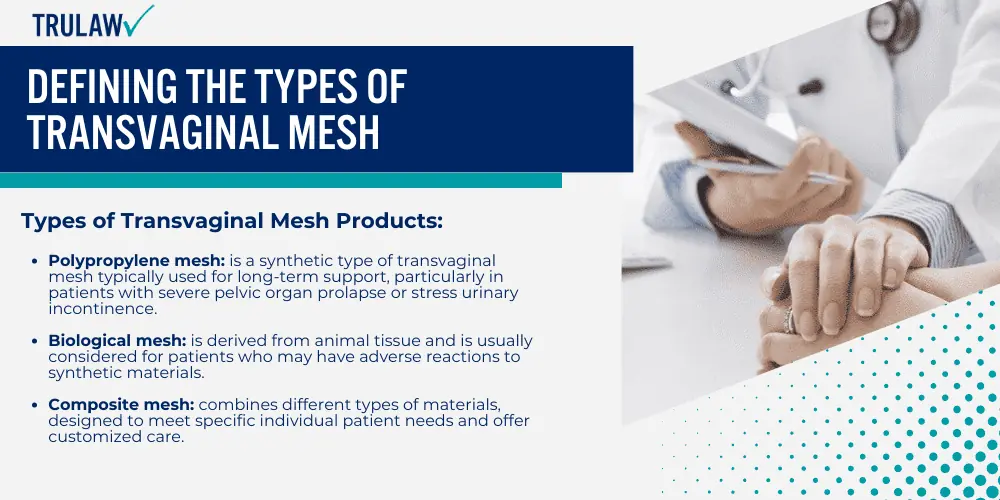
It’s similar to a net in structure and can be made from synthetic materials like polymers or biological material such as animal tissue.
The mesh actually acts as a scaffold that allows new tissues to grow through its pores, thus providing long-term reinforcement for the affected area.
Types of Transvaginal Mesh Products
- Polypropylene mesh: is a synthetic type of transvaginal mesh typically used for long-term support, particularly in patients with severe pelvic organ prolapse or stress urinary incontinence.
- Biological mesh: is derived from animal tissue and is usually considered for patients who may have adverse reactions to synthetic materials.
- Composite mesh: combines different types of materials, designed to meet specific individual patient needs and offer customized care.
- Absorbable and non-absorbable mesh: the difference between these types of transvaginal mesh products depends whether temporary or long-lasting support is necessary.
Remember, the type of mesh selected for a procedure relies heavily on a patient’s unique medical condition, the severity of their symptoms, their overall health, and their surgeon’s expertise and preference.
Therefore, it’s vital for patients to discuss the options with their healthcare providers thoroughly before making a decision.
Manufacturers of Pelvic Mesh Products
Several major manufacturers have produced transvaginal mesh products designed to assist in the surgical treatment of pelvic organ prolapse and stress urinary incontinence.
These products can differ greatly in their structure, design, and materials used, which can affect their efficacy and potential complications.
Let’s take a look at the major manufacturers in the industry and their respective pelvic mesh products:
- Gynecare Prolift: A pelvic mesh product designed by Ethicon, (a subsidiary of Johnson & Johnson), to provide support and repair pelvic organ prolapse.
- Advantage Transvaginal Mid-Urethral Sling System: A sling system created by Boston Scientific to address stress urinary incontinence in women.
- Apogee Vaginal Vault Prolapse Repair System: A system designed by American Medical Studies to correct vaginal vault prolapse.
- Avaulta Plus: A biologic implant designed by C.R. Bard for the treatment of pelvic organ prolapse.
In April 2019, the FDA ordered all manufacturers to cease the production and distribution of surgical mesh intended for transvaginal repair of pelvic organ prolapse.
Despite this, surgical mesh products may still be used for other procedures, such as treatment of stress urinary incontinence and abdominal repair of pelvic organ prolapse.
It is crucial to discuss all potential treatment options, along with their associated risks and benefits, with your healthcare provider.
Transvaginal Mesh Usage
Transvaginal mesh is primarily used in surgeries to treat pelvic organ prolapse (POP) and stress urinary incontinence (SUI).
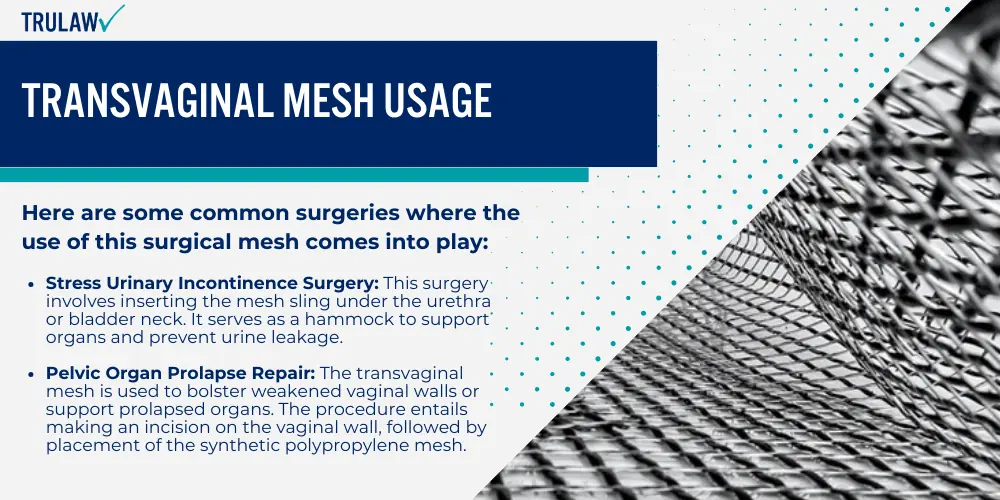
It’s inserted using advanced surgical techniques, acting as a support to weakened or damaged tissue.
However, the use of transvaginal mesh comes with potential risks and complications—such as mesh erosion—that must be carefully considered before opting for such medical procedures.
Common Surgeries using Transvaginal Mesh
Transvaginal mesh is utilized in various medical procedures to address conditions like stress urinary incontinence and pelvic organ prolapse.
Here are some common surgeries where the use of this surgical mesh comes into play:
- Stress Urinary Incontinence Surgery: This surgery involves inserting the mesh sling under the urethra or bladder neck. It serves as a hammock to support organs and prevent urine leakage.
- Pelvic Organ Prolapse Repair: The transvaginal mesh is used to bolster weakened vaginal walls or support prolapsed organs. The procedure entails making an incision on the vaginal wall, followed by placement of the synthetic polypropylene mesh.
- Sacral Colpopexy: Although not a strictly transvaginal procedure, sacral colpopexy uses a mesh implant to treat pelvic organ prolapse through an abdominal approach. Notably, this method may lead to lower rates of mesh complications compared to transvaginal surgery.
- Transabdominal Mesh Procedure: Similar to sacral colpopexy, this procedure uses a surgical mesh inserted through an abdominal approach rather than through the vagina, again aiming for fewer mesh-related complications.
- Non-Absorbable Synthetic Mesh Placement: In specific cases where individual health or anatomy considerations prevail, surgeons opt for non-absorbable synthetic meshes which remain in place permanently providing long-term reinforcement to weakened or damaged tissue.
- Surgical Treatments with Animal-Derived Mesh: For patients considered high risk due to certain conditions or allergies, meshes derived from animal tissue may be used as alternatives to synthetic materials when performing these surgeries.
Surgical Techniques for Inserting Mesh
Transvaginal mesh insertion involves various surgical techniques that surgeons use to treat conditions like pelvic organ prolapse or stress urinary incontinence.
These procedures require meticulous care and expertise due to the delicate nature of the female pelvic anatomy.
Here are some common methods:
- Surgeons make an incision in the vaginal wall, as per our important facts.
- They strategically place the transvaginal mesh to support prolapsed organs, aiding in their realignment and stabilization.
- The mesh reinforces the weakened or damaged tissue of the vaginal wall, providing much-needed strength.
- Surgeons use sutures to secure the transvaginal mesh onto surrounding tissues for maximum hold and durability.
- In some cases, they may insert a mesh sling around the urethra or bladder neck for treating stress urinary incontinence (SUI).
- Less commonly used is a technique involving transabdominal mesh placement instead of transvaginal.
- After implantation, surgeons will close any incisions with stitches.
Risks and Complications of Transvaginal Mesh Implants
Transvaginal mesh implants, though commonly used to treat conditions like pelvic organ prolapse (POP) and stress urinary incontinence (SUI), can pose significant health risks.
These can include severe pain, infection, and bleeding.
Specifically, complications such as vaginal mesh erosion or the tearing of tissue caused by the implant have been reported.
In cases of erosion due to mispositioned or poorly functioning implants, exposure of the mesh through the vaginal wall.
Some women have suffered from perforated organs due to transvaginal mesh procedures.
Recent Developments in Transvaginal Mesh Usage
Explore the latest updates on Transvaginal Mesh usage, including FDA mandates and product recalls for further insight into this critical medical device.
Stay tuned to learn more about these developments and their implications on women’s health.
FDA Orders to Stop Selling Devices for Transvaginal Repair
The FDA took a significant step towards safeguarding women’s health by ordering manufacturers to stop selling and distributing devices used for transvaginal repair of pelvic organ prolapse.
This decision came after the organization noted disturbing complications associated with these surgical mesh products, including serious injuries.
Some types of synthetic mesh, once hailed as effective in treating stress urinary incontinence and weakened vaginal wall conditions, were identified as particularly problematic.
Notably, even before this directive from the FDA, some companies had voluntarily discontinued their controversial transvaginal mesh implants due to rising complaints about serious complications among patients.
The overall goal behind this order is the FDA’s commitment to stringent regulation of urogynecologic surgical mesh devices – a tactic aimed at ensuring medical device safety while keeping patient well-being paramount.
Warnings and Recalls
The FDA has played an integral role in overseeing the use of transvaginal mesh devices.
Serious complications linked to these implants, such as persistent pain and life-altering effects, have led to strict regulations.
In recent years, manufacturers received orders from the FDA to halt sales of such devices used for transvaginal repair of pelvic organ prolapse.
In addition to this decisive action, recalls have become a common occurrence in the industry.
The governmental agency now advocates for alternative surgical methods like transabdominal mesh instead of transvaginal ones due to additional risks associated with them.
These actions showcase the determination of authorities in ensuring women’s health is not compromised by medical procedures or products.
Alternative Treatment Options
Explore various alternative treatment options for pelvic floor disorders, ranging from non-surgical methods such as physiotherapy to other surgical procedures minus the use of mesh.
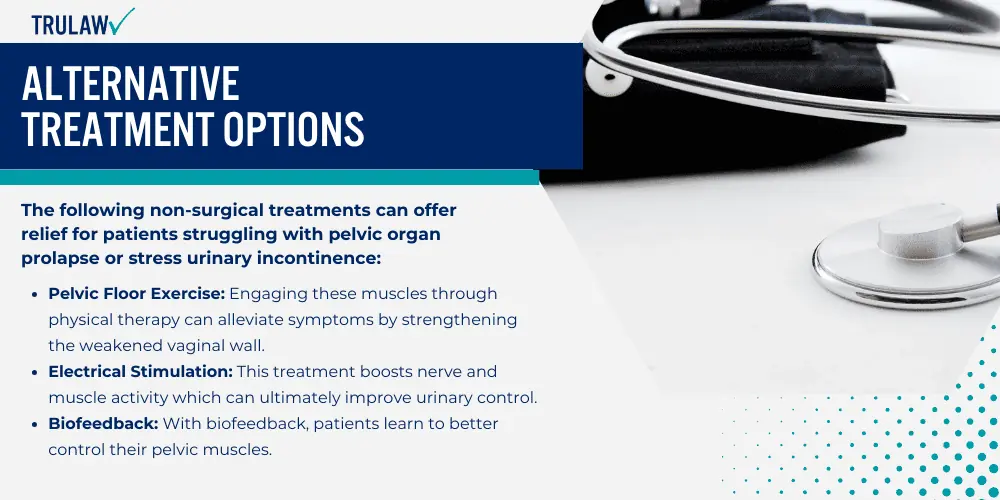
Non-Surgical Treatments
These alternatives provide an essential choice for women who cannot undergo surgery, prefer to avoid it, or seek supplementary therapies alongside surgical options.
The following non-surgical treatments can offer relief for patients struggling with pelvic organ prolapse or stress urinary incontinence:
- Pelvic Floor Exercise: Engaging these muscles through physical therapy can alleviate symptoms by strengthening the weakened vaginal wall.
- Electrical Stimulation: This treatment boosts nerve and muscle activity which can ultimately improve urinary control.
- Biofeedback: With biofeedback, patients learn to better control their pelvic muscles.
- Vaginal Support Devices: Women may use pessaries, silicon-based inserts that support organs falling into the vagina due to a weakened pelvic floor.
- Weight loss and lifestyle changes: Dietary changes and regular exercise can reduce episodes of urine leakage associated with stress urinary incontinence.
- Medication: Certain medications can help manage the symptoms of overactive bladder syndrome related to stress urinary incontinence.
Surgical Treatments (Other than Mesh)
While surgical mesh serves as a commonly used option, there are other surgical treatments available for women dealing with conditions like pelvic organ prolapse and stress urinary incontinence.
- Sacral Colpopexy: This abdominal procedure is often favored for its lower rates of complications compared to transvaginal POP surgeries. It utilizes the patient’s own tissue or graft material to provide support for pelvic organs.
- Native Tissue Repair: This method uses the patient’s tissues to reinforce weakened or damaged areas. Recent randomized trials have shown better anatomical outcomes with this technique compared to using surgical mesh.
- Sling Procedures: These procedures use human or animal tissue, synthetic materials, or a combination of both to create a hammock-like structure that supports the urethra and bladder neck.
- Burch Colposuspension: This major invasive surgery involves suturing the side walls of the vagina to the Coopers ligament on the pubic bone, providing additional support.
- Bladder Neck Suspension: Similar to Burch Colposuspension, it provides extra support by attaching sutures in vaginal tissue near the neck of the bladder and securing them to ligaments close to pubic bone.
- Prolapse and Stress Incontinence Surgery: Whilst being a more complex surgery usually recommended when other methods have failed, it has dual benefits by treating both conditions simultaneously.
Concerns Regarding Transvaginal Mesh Surgery
Unravel the worries and issues surrounding transvaginal mesh surgeries, including reports to the Therapeutic Goods Administration (TGA), patient rights under the Charter of Healthcare Rights, and avenues for raising concerns such as through the Health Complaints Commissioner or Freedom of Information Commissioner.
Keep reading to understand more about this important medical topic.
Reports to the Therapeutic Goods Administration (TGA)
The Therapeutic Goods Administration (TGA) has been actively involved in overseeing the use of transvaginal mesh.
In recent years, they received 99 adverse event reports related to urogynecologic surgical meshes between July 2012 and June 2016.
This prompted them to cancel the approval of two specific types of this mesh in November 2017.
Consequently, all transvaginal mesh products used solely for treating pelvic organ prolapse have since been removed from the market due to reported complications and side effects.
The TGA continues its efforts to monitor and regulate these devices ensuring protection and safety for patients undergoing transvaginal surgeries.
Charter of Healthcare Rights
Patients facing transvaginal mesh surgery have rights enshrined in the Charter of Healthcare Rights. This crucial document ensures informed consent, promoting transparency between a patient and their healthcare provider.
It allows individuals to engage in open dialogues about potential risks, like those associated with various types of transvaginal mesh implants.
The Charter further guarantees access to quality care and fosters respectful treatment, emphasizing dignity even amidst medical concerns.
Patients’ ability to understand all aspects of their situation is central to this charter, ensuring they comprehend the procedures that involve transvaginal mesh products fully.
Notably, understanding these rights can empower patients undergoing surgical treatments involving surgical mesh devices or grappling with urinary incontinence issues due to weakened vaginal walls or pelvic organs.
Health Complaints Commissioner
The Health Complaints Commissioner plays a critical role in handling issues related to the use of transvaginal mesh.
This independent agency allows patients who have experienced complications from their surgical treatments to voice their concerns and file formal complaints.
They tirelessly work toward improving healthcare standards through impartial investigations into these complaints, offering an avenue for those affected by defective medical devices like transvaginal mesh implants.
Their commitment ensures that everyone has the right to safe, satisfactory health services without fear of adverse effects or inadequate care.
Furthermore, they play a significant part in striving for transparency and accountability within the healthcare system.
Freedom of Information Commissioner
The Freedom of Information Commissioner plays a crucial role in protecting patient rights, especially in sensitive medical issues like transvaginal mesh surgery.
This commissioner ensures that any request for access to documents about operations or procedures involving the use of transvaginal mesh should be provided by health service providers.
They work diligently to make sure women have all necessary information relating to this surgical procedure.
Furthermore, through their efforts, the transparency and accountability within healthcare systems are heightened.
Women can gain insight into reports submitted about transvaginal meshes or severe complications resulting from these devices.
Thus, everyone involved – patients, doctors and manufacturers – has an obligation towards honesty and openness when it comes to discussing surgical treatment options such as the types of transvaginal meshes available.
Individuals with Transvaginal Mesh Implants: Support and Resources
It’s vital to know that there are various support systems and resources available for individuals with transvaginal mesh implants, these include the Victorian Mesh Information and Helpline – a service providing information and guidance about transvaginal mesh.
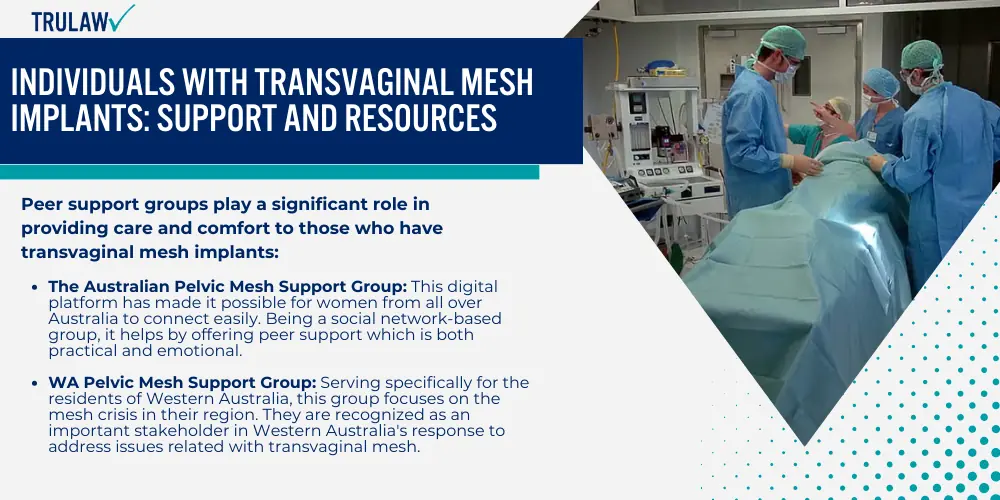
Peer support groups can offer a safe space for sharing experiences and seeking advice from others who have undergone similar surgical procedures.
Hospital programs provide patients with tailored care plans, targeted therapy sessions, and post-surgery follow-ups for efficient recovery.
Other informational materials such as brochures, websites, videos on pelvic floor disorders, urinary incontinence treatment options including transvaginal mesh procedure are also accessible to enhance understanding of these conditions.
Victorian Mesh Information and Helpline
The Victorian Mesh Information and Helpline provides an essential resource for those dealing with transvaginal mesh implants.
The helpline does more than just answer questions; it offers solace to those grappling with complications from transvaginal mesh.
Established in December 2017 by the State of Victoria, this service serves as a beacon of assistance at both national and state levels for women experiencing issues related to their implants.
With such resources available, no one must feel alone or unheard while confronting the challenges presented by transvaginal mesh procedures.
Peer Support Groups
Peer support groups play a significant role in providing care and comfort to those who have transvaginal mesh implants.
- The Australian Pelvic Mesh Support Group: This digital platform has made it possible for women from all over Australia to connect easily. Being a social network-based group, it helps by offering peer support which is both practical and emotional.
- WA Pelvic Mesh Support Group: Serving specifically for the residents of Western Australia, this group focuses on the mesh crisis in their region. They are recognized as an important stakeholder in Western Australia’s response to address issues related with transvaginal mesh.
- Local Hospital Programs: Several hospitals run programs designed to aid patients dealing with transvaginal mesh implants. They provide a space where individuals can share experiences, ask questions, and learn more about living with their condition.
- Health Professional Facilitated Sessions: With the guidance of qualified health professionals, these sessions prove very beneficial for those dealing with post-surgical complications or apprehensions around surgery.
- Informational Materials Distribution: Many peer support groups distribute fact sheets, brochures or even books that offer comprehensive information on transvaginal mesh and related topics.
- Emotional Support Offered: Besides exchanging practical information, these groups also help combat feelings of isolation by encouraging emotional support between individuals going through similar experiences.
These platforms act as an essential resource for women seeking advice, emotional support, or information about their medical condition.
Hospital Programs
Many hospitals have specialist programs aimed at providing care and support for women who are dealing with complications from transvaginal mesh implants.
As part of their services, the following features are usually encompassed:
- Practical information on how to manage mesh complications is shared with patients.
- Emotional support is available to women navigating the physical and mental stresses that can arise from these complications.
- Multidisciplinary teams, often composed of urologists, gynecologists, and physiotherapists work collaboratively to provide comprehensive treatment plans tailored to each individual’s needs.
- Referral systems within these programs allow for quick access to specialists like psychologists or dietitians when additional support is needed.
- Educational seminars and workshops are organized regularly to keep patients informed about any development in the field.
- Peer-to-peer groups are formed as a safe space where patients can share their experiences, fears, hopes, and receive encouragement from others going through similar situations.
These programs offer a wealth of resources to equip individuals in managing different types of transvaginal mesh.
The Controversy Surrounding Transvaginal Mesh
This section will delve into the ongoing controversy and debate surrounding the use of transvaginal mesh, discussing its historical usage in pelvic floor surgery, and highlighting significant issues like severe complications reported with the treatment modality for pelvic organ prolapse (POP), which have led to numerous lawsuits and investigations.
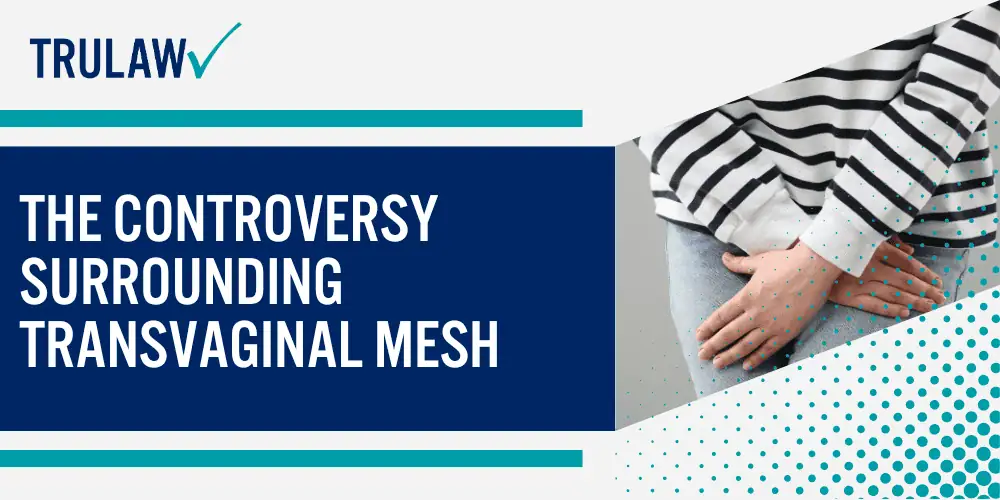
History and Use of Mesh in Pelvic Floor Surgery
Surgeons first introduced mesh into pelvic floor surgery during the 1950s. Initially, they used it to treat abdominal hernias before transitioning its use for pelvic organ prolapse (POP) and stress urinary incontinence (SUI).
The most prominent change occurred in the late 1990s when doctors moved from using non-absorbable synthetic mesh for transabdominal procedures to a full-scale adoption of surgical mesh devices for transvaginal repair.
Innovations such as the introduction of Type I monofilament, large-pore polypropylene mesh, have greatly advanced this field.
However, despite technological advancements, complications associated with transvaginal mesh implants sparked controversy and ongoing debate within the medical community about its safety and efficacy.
Newer methods are presently under exploration as alternatives to mesh for POP repair due to rising concerns tied to these issues.
Problems with Transvaginal Mesh for Pelvic Organ Prolapse
Transvaginal mesh, a surgical material used to treat pelvic organ prolapse (POP), frequently creates unanticipated health issues. Vaginal mesh erosion is one such complication where the synthetic material gradually wears away or migrates into other delicate organs, causing severe damage and excruciating pain.
Another alarming issue with transvaginal mesh are reported instances of organ perforation.
This perilous event happens when the surgical mesh pierces into nearby organs like the bladder or bowel, which can lead to grievous infections and potentially life-threatening conditions if not treated promptly.
The sheer frequency of these risks led FDA to ban this device due its high complication rate compared to alternative treatments for POP.
Pain during intercourse (dyspareunia) also plagues many women who have received this type of surgical treatment.
It’s an upsetting reality that impacts relationships and individual well-being significantly.
Regrettably, some women experience complications years after their initial surgery using mesh slings for bladder support, further intensifying concerns surrounding these devices’ safety profile.
Lastly, another problem occurs when synthetic materials from these meshes become non-absorbable in human bodies leading to additional adverse effects over time; thus demanding safer and more effective alternatives in treating pelvic floor disorders amongst females worldwide.
Legal Help for Defective Transvaginal Mesh Products
Explore options for obtaining legal assistance if you’ve been affected by defective transvaginal mesh products, get insights on how to contact a lawyer specializing in medical product litigation, and stay informed about current cases being investigated pertaining to faulty mesh devices.

Contacting a Defective Transvaginal Mesh Products Lawyer
Finding the right lawyer for a defective transvaginal mesh product case is an important step.
These lawyers specialize in this field, offering free consultations and clear guidance throughout the process.
They can help clients understand their rights and potential to receive compensation.
This legal support becomes even more crucial when facing large corporations that manufacture these products, as these entities may be held accountable for failing to warn about product risks.
Without professional legal assistance, navigating through complex lawsuit procedures could be overwhelming and frustrating.
Current Cases Being Investigated
Numerous lawsuits are currently unfolding across the globe against manufacturers of transvaginal mesh, including Johnson & Johnson, known for their widely-used products.
Many women who suffered severe complications from this medical device have taken legal action to seek compensation for their injuries.
Some outcomes have resulted in multi-million dollar settlements, amplifying concerns about the safety of these devices.
As the battles in courtrooms continue, regulators and healthcare professionals are closely monitoring these cases to reevaluate surgical practices involving transvaginal mesh.
Notably, no two cases are alike due to individual health conditions and different types of mesh used during surgeries which makes it crucial to evaluate each case separately and thoroughly.
Closing Concerns About Transvaginal Mesh
Understanding transvaginal mesh types and their purposes is imperative for making informed decisions about your health.
If you’ve experienced vaginal mesh complications, injuries, or adverse effects from a transvaginal mesh implant- you may be eligible to file for the Transvaginal Mesh Lawsuit.
Contact the experienced Transvaginal Mesh Lawyers at TruLaw today for a no-obligation consultation.
We’re here to help you seek the compensation you deserve.
Transvaginal Mesh Lawsuit Frequently Asked Questions
-
What types of transvaginal mesh are mentioned in Lawsuits?
These are a few examples of the types of transvaginal mesh products that have been mentioned in lawsuits.
It is important to note that the actual mesh products involved in legal cases may vary, and individuals should consult a Transvaginal Mesh Attorney at TruLaw to discuss information relating to their case.
Some of the commonly mentioned types of transvaginal mesh in these lawsuits include:
- Ethicon Gynecare: Ethicon, a subsidiary of Johnson & Johnson, manufactured various types of transvaginal mesh products, including Gynecare TVT (tension-free vaginal tape) and Gynecare Prolift.
- Boston Scientific: Some of the mesh products mentioned in these lawsuits include the Obtryx, Pinnacle, and Uphold mesh.
- Bard Avaulta: Avaulta Plus and Avaulta Solo mesh are among the products mentioned in these cases.
- American Medical Systems (AMS): AMS, now a subsidiary of Boston Scientific, manufactured transvaginal mesh products such as the Apogee, Elevate, and Perigee mesh.
-
What types of Transvaginal Mesh are still used in treatment today?
Despite the FDA’s ban on transvaginal mesh for pelvic organ prolapse, there are still some types of transvaginal mesh that are used in treatment for other conditions.
The types of transvaginal mesh still used in treatment include:
- Composite mesh: This type of mesh combines nonabsorbable synthetic, absorbable synthetic, or biologic materials.
- Nonabsorbable synthetic mesh: This mesh is made from synthetic materials like plastic or polyester, with synthetic polypropylene being the most commonly used material for treating pelvic floor disorders.
It is important to note that the use of transvaginal mesh for any condition is still controversial, and there are risks associated with all surgical mesh implants.
Women who are considering transvaginal mesh surgery should talk to their doctor about the risks and benefits carefully.
-
What are the recent updates and developments in transvaginal mesh usage?
Recent updates and developments in transvaginal mesh usage have sparked significant controversy and discussion among gynecologists. The use of transvaginal pelvic mesh for prolapse surgery has been a focus of concern and debate.
Here are some key points regarding recent updates and developments in transvaginal mesh usage:
- Increased Awareness of Complications: There has been growing awareness of the potential complications associated with transvaginal mesh implants.
- Regulatory Actions: Regulatory agencies, such as the FDA, have taken action to address the safety concerns surrounding transvaginal mesh. In some cases, the use of certain mesh products has been restricted or banned.
- Litigation and Settlements: Thousands of lawsuits have been filed against mesh manufacturers, resulting in significant settlements. This has led to increased scrutiny and caution in the use of transvaginal mesh implants.
-
What are the alternative treatment options for pelvic organ prolapse and stress urinary incontinence?
In 2019, the FDA ordered manufacturers to stop selling surgical mesh devices intended for transvaginal repair of pelvic organ prolapse.
Alternative treatment options for pelvic organ prolapse and stress urinary incontinence include:
- Physical therapy: Physical therapy can help to strengthen the pelvic floor muscles and improve symptoms.
- Bladder retraining: Bladder retraining techniques can help to improve bladder control.
- Pessaries: Pessaries are devices that are inserted into the vagina to support the pelvic organs.
- Surgery: Surgery is an option for women who have severe symptoms or who do not respond to other treatments.
- What are the recent updates and developments in transvaginal mesh usage?
-
What is the FDA's stance on surgical mesh implants?
The FDA has taken action to protect women’s health by ordering manufacturers of surgical mesh to stop selling all devices.
As a result, most manufacturers have withdrawn these devices from the market.
This action was taken to address safety concerns associated with the use of urogynecologic surgical mesh implants.

Managing Attorney & Owner
With over 25 years of legal experience, Jessica Paluch-Hoerman is an Illinois lawyer, a CPA, and a mother of three. She spent the first decade of her career working as an international tax attorney at Deloitte.
In 2009, Jessie co-founded her own law firm with her husband – which has scaled to over 30 employees since its conception.
In 2016, Jessie founded TruLaw, which allows her to collaborate with attorneys and legal experts across the United States on a daily basis. This hypervaluable network of experts is what enables her to share the most reliable, accurate, and up-to-date legal information with our readers!
Additional Transvaginal Mesh Lawsuit resources on our website:
Here, at TruLaw, we’re committed to helping victims get the justice they deserve.
Alongside our partner law firms, we have successfully collected over $3 Billion in verdicts and settlements on behalf of injured individuals.
Would you like our help?
At TruLaw, we fiercely combat corporations that endanger individuals’ well-being. If you’ve suffered injuries and believe these well-funded entities should be held accountable, we’re here for you.
With TruLaw, you gain access to successful and seasoned lawyers who maximize your chances of success. Our lawyers invest in you—they do not receive a dime until your lawsuit reaches a successful resolution!
AFFF Lawsuit claims are being filed against manufacturers of aqueous film-forming foam (AFFF), commonly used in firefighting.
Claims allege that companies such as 3M, DuPont, and Tyco Fire Products failed to adequately warn users about the potential dangers of AFFF exposure — including increased risks of various cancers and diseases.
Depo Provera Lawsuit claims are being filed by individuals who allege they developed meningioma (a type of brain tumor) after receiving Depo-Provera birth control injections.
A 2024 study found that women using Depo-Provera for at least 1 year are five times more likely to develop meningioma brain tumors compared to those not using the drug.
Suboxone Tooth Decay Lawsuit claims are being filed against Indivior, the manufacturer of Suboxone, a medication used to treat opioid addiction.
Claims allege that Indivior failed to adequately warn users about the potential dangers of severe tooth decay and dental injuries associated with Suboxone’s sublingual film version.
Social Media Harm Lawsuits are being filed against social media companies for allegedly causing mental health issues in children and teens.
Claims allege that companies like Meta, Google, ByteDance, and Snap designed addictive platforms that led to anxiety, depression, and other mental health issues without adequately warning users or parents.
Transvaginal Mesh Lawsuits are being filed against manufacturers of transvaginal mesh products used to treat pelvic organ prolapse (POP) and stress urinary incontinence (SUI).
Claims allege that companies like Ethicon, C.R. Bard, and Boston Scientific failed to adequately warn about potential dangers — including erosion, pain, and infection.
Bair Hugger Warming Blanket Lawsuits involve claims against 3M — alleging their surgical warming blankets caused severe infections and complications (particularly in hip and knee replacement surgeries).
Plaintiffs claim 3M failed to warn about potential risks — despite knowing about increased risk of deep joint infections since 2011.
Baby Formula NEC Lawsuit claims are being filed against manufacturers of cow’s milk-based baby formula products.
Claims allege that companies like Abbott Laboratories (Similac) and Mead Johnson & Company (Enfamil) failed to warn about the increased risk of necrotizing enterocolitis (NEC) in premature infants.
Here, at TruLaw, we’re committed to helping victims get the justice they deserve.
Alongside our partner law firms, we have successfully collected over $3 Billion in verdicts and settlements on behalf of injured individuals.
Would you like our help?
